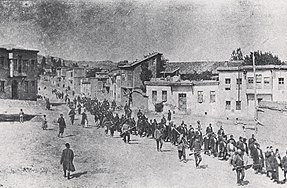
Back مسيرة موت Arabic Ölüm yürüşü Azerbaijani Marxa de la mort Catalan Pochod smrti Czech Todesmarsch German Marŝo de morto Esperanto Marcha de la muerte Spanish Heriotzaren martxa Basque راهپیمایی مرگ Persian Kuolemanmarssi Finnish

A death march is a forced march of prisoners of war or other captives or deportees in which individuals are left to die along the way.[1] It is distinguished from simple prisoner transport via foot march. Article 19 of the Geneva Convention requires that prisoners must be moved away from a danger zone such as an advancing front line, to a place that may be considered more secure. It is not required to evacuate prisoners who are too unwell or injured to move. In times of war, such evacuations can be difficult to carry out.
Death marches usually feature harsh physical labor and abuse, neglect of prisoner injury and illness, deliberate starvation and dehydration, humiliation, torture, and execution of those unable to keep up the marching pace. The march may end at a prisoner-of-war camp or internment camp, or it may continue until all those who are forced to march are dead.
- ^ "Definition of DEATH MARCH". www.merriam-webster.com.